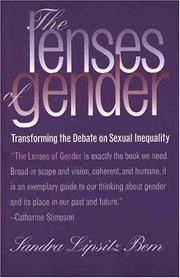| Listing 1 - 6 of 6 |
Sort by
|

ISBN: 0300056761 Year: 1993 Publisher: London Yale University Press
Abstract | Keywords | Export | Availability | Bookmark
 Loading...
Loading...Choose an application
- Reference Manager
- EndNote
- RefWorks (Direct export to RefWorks)
Developmental psychology --- Equality. --- Gender identity. --- Sex differences (Psychology) --- Sex role. --- Sexism. --- Sex differences (Psychology). --- Equality --- Gender identity --- Sexism --- Sex role --- Sex bias --- Attitude (Psychology) --- Prejudices --- Sex (Psychology) --- Social perception --- Egalitarianism --- Inequality --- Social equality --- Social inequality --- Political science --- Sociology --- Democracy --- Liberty --- Gender role --- Social role --- Gender expression --- Sex identity (Gender identity) --- Sexual identity (Gender identity) --- Identity (Psychology) --- Queer theory --- Gender roles --- Gendered role --- Gendered roles --- Role, Gender --- Role, Gendered --- Role, Sex --- Roles, Gender --- Roles, Gendered --- Roles, Sex --- Sex roles --- Gender dysphoria

ISBN: 0300074247 Year: 1998 Publisher: London Yale University Press
Abstract | Keywords | Export | Availability | Bookmark
 Loading...
Loading...Choose an application
- Reference Manager
- EndNote
- RefWorks (Direct export to RefWorks)
"In 1965, when psychologists Sandra and Daryl Bem met and married, they were determined to function as truly egalitarian partners and to raise their children in accordance with gender-liberated, anti-homophobic, and sex-positive feminist ideals." "This book by Sandra Bem, an autobiographical account of the Bems' nearly thirty-year marriage, is both a personal history of the Bems' past and a social history of a key period in feminism's past. It is also a look into feminism's future, because the Bems' children, Emily and Jeremy, now in their early twenties, speak in the book as well."--Jacket.
Communication in families --- Equality --- Families --- Feminism --- Man-woman relationships --- Sex role --- Female-male relationships --- Male-female relationships --- Men --- Men-women relationships --- Relationships, Man-woman --- Woman-man relationships --- Women --- Women-men relationships --- Interpersonal relations --- Mate selection --- Emancipation of women --- Feminist movement --- Women's lib --- Women's liberation --- Women's liberation movement --- Women's movement --- Social movements --- Anti-feminism --- Family --- Family life --- Family relationships --- Family structure --- Relationships, Family --- Structure, Family --- Social institutions --- Birth order --- Domestic relations --- Home --- Households --- Kinship --- Marriage --- Matriarchy --- Parenthood --- Patriarchy --- Egalitarianism --- Inequality --- Social equality --- Social inequality --- Political science --- Sociology --- Democracy --- Liberty --- Communication in the family --- Family communication --- Gender role --- Sex (Psychology) --- Sex differences (Psychology) --- Social role --- Gender expression --- Sexism --- Relations with women --- Relations with men --- Emancipation --- Social aspects --- Social conditions --- Gender roles --- Gendered role --- Gendered roles --- Role, Gender --- Role, Gendered --- Role, Sex --- Roles, Gender --- Roles, Gendered --- Roles, Sex --- Sex roles

ISBN: 0585352585 9780585352589 9780300154252 0300154259 9780300061635 0300061633 0300056761 9780300056761 Year: 1994 Publisher: [Place of publication not identified] Yale University Press
Abstract | Keywords | Export | Availability | Bookmark
 Loading...
Loading...Choose an application
- Reference Manager
- EndNote
- RefWorks (Direct export to RefWorks)
In this book a leading theorist on sex and gender discusses how hidden assumptions embedded in our cultural discourses, social institutions, and individual psyches perpetuate male power and oppress women and sexual minorities. Sandra Lipsitz Bem argues that these assumptions, which she calls the lenses of gender, shape not only perceptions of social reality but also the more material things-like unequal pay and inadequate daycare-that constitute social reality itself. Her penetrating and articulate examination of these hidden cultural lenses enables us to look at them rather than through them and to better understand recent debates on gender and sexuality.According to Bem, the first lens, androcentrism (male-centeredness), defines males and male experience as a standard or norm and females and female experience as a deviation from that norm. The second lens, gender polarization, superimposes male-female differences on virtually every aspect of human experience, from modes of dress and social roles to ways of expressing emotion and sexual desire. The third lens, biological essentialism, rationalizes and legitimizes the other two lenses by treating them as the inevitable consequences of the intrinsic biological natures of women and men.After illustrating the pervasiveness of these three lenses in both historical and contemporary discourses of Western culture, Bem presents her own theory of how the individual either acquires cultural gender lenses and constructs a conventional gender identity or resists cultural lenses and constructs a gender-subversive identity. She contends that we must reframe the debate on sexual inequality so that it focuses not on the differences between men and women but on how male-centered discourses and institutions transform male-female difference into female disadvantage.
Gender & Ethnic Studies --- Social Sciences --- Gender Studies & Sexuality --- Sex role. --- Sex differences (Psychology) --- Sexism. --- Equality. --- Gender identity. --- Sex identity (Gender identity) --- Sexual identity (Gender identity) --- Identity (Psychology) --- Sex (Psychology) --- Queer theory --- Egalitarianism --- Inequality --- Social equality --- Social inequality --- Political science --- Sociology --- Democracy --- Liberty --- Sex bias --- Attitude (Psychology) --- Prejudices --- Social perception --- Sex role --- Gender role --- Social role --- Gender expression --- Sexism --- Gender roles --- Gendered role --- Gendered roles --- Role, Gender --- Role, Gendered --- Role, Sex --- Roles, Gender --- Roles, Gendered --- Roles, Sex --- Sex roles

ISBN: 0300148054 0585368317 9780585368313 9780300148053 0300074247 9780300074246 0300074247 Year: 2008 Publisher: New Haven, CT : Yale University Press,
Abstract | Keywords | Export | Availability | Bookmark
 Loading...
Loading...Choose an application
- Reference Manager
- EndNote
- RefWorks (Direct export to RefWorks)
In 1965, when psychologists Sandra and Daryl Bem met and married, they were determined to function as truly egalitarian partners and also to raise their children in accordance with gender-liberated, anti-homophobic, and sex-positive feminist ideals. During the next ten years, they exuberantly shared the details of their daily lives in both public lectures and the mass media in order to provide at least one concrete example of an alternative to the traditional heterosexual family. In the 1990s, Sandra Bem also published an award-winning book, The Lenses of Gender, which spelled out the feminist theory behind their feminist practices.This second book by Sandra Bem, an autobiographical account of the Bems nearly thirty-year marriage, is both a personal history of the Bems past and a social history of a key period in feminisms past. It is also a look into feminisms future, because the Bems children, Emily and Jeremy, now in their early twenties, speak at length in the book as well.Bem analyzes what aspects of family background and psychological makeup led her and Daryl to bond so immediately and to become gender pioneers. She describes the egalitarianism and feminist child-rearing that they invented for their private needs and tells how these family agendas were transformed into public feminist discourse. Finally she reassesses this early feminist union now that the marriage has come to an end and the children are young adults, evaluating (with the help of lengthy interviews with Emily and Jeremy and a brief epilogue by Daryl) what the Bems experiences-both positive and negative-have to say about the viability and necessity of nontraditional gender arrangements in society today.
Sex role. --- Families. --- Communication in the family. --- Man-woman relationships. --- Feminism. --- Equality. --- Communication in families. --- Sex role --- Families --- Communication in families --- Man-woman relationships --- Feminism --- Equality --- Gender Studies & Sexuality --- Gender & Ethnic Studies --- Social Sciences --- Egalitarianism --- Inequality --- Social equality --- Social inequality --- Political science --- Sociology --- Democracy --- Liberty --- Emancipation of women --- Feminist movement --- Women --- Women's lib --- Women's liberation --- Women's liberation movement --- Women's movement --- Social movements --- Anti-feminism --- Female-male relationships --- Male-female relationships --- Men --- Men-women relationships --- Relationships, Man-woman --- Woman-man relationships --- Women-men relationships --- Interpersonal relations --- Mate selection --- Communication in the family --- Family communication --- Family --- Family life --- Family relationships --- Family structure --- Relationships, Family --- Structure, Family --- Social institutions --- Birth order --- Domestic relations --- Home --- Households --- Kinship --- Marriage --- Matriarchy --- Parenthood --- Patriarchy --- Gender role --- Sex (Psychology) --- Sex differences (Psychology) --- Social role --- Gender expression --- Sexism --- Emancipation --- Relations with women --- Relations with men --- Social aspects --- Social conditions --- Gender roles --- Gendered role --- Gendered roles --- Role, Gender --- Role, Gendered --- Role, Sex --- Roles, Gender --- Roles, Gendered --- Roles, Sex --- Sex roles
Year: 1979 Publisher: Palo Alto: Consulting psychologists press,
Abstract | Keywords | Export | Availability | Bookmark
 Loading...
Loading...Choose an application
- Reference Manager
- EndNote
- RefWorks (Direct export to RefWorks)
Application : individuelle Temps de passation : 10'
Book
Year: 1993 Publisher: New Haven Yale University Press
Abstract | Keywords | Export | Availability | Bookmark
 Loading...
Loading...Choose an application
- Reference Manager
- EndNote
- RefWorks (Direct export to RefWorks)
Onderzoekt de oorsprong en de gevolgen van enkele hardnekkige ideologische voorstellingen in de westerse cultuur: het androcentrisme, het biologisch determinisme en de polarisatie van de seksen.
Philosophy --- Political philosophy. Social philosophy --- Depth psychology --- Sociology of minorities --- Sociology of the family. Sociology of sexuality --- Essentialism --- Gender --- Gender roles --- Androcentrism --- Psychoanalysis --- Sexism --- Biological determinism --- Book --- Sex differences --- Discrimination
| Listing 1 - 6 of 6 |
Sort by
|

 Search
Search Feedback
Feedback About UniCat
About UniCat  Help
Help News
News